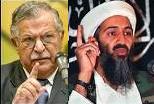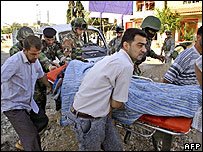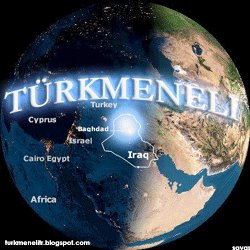
By Ali Al-Hail
Al-Jazeerah, October 11, 2006
Recent frantic shift by the neocons in the US to negotiate with Taliban of Afghanistan, and to support demands from the Kurds led by Talabani, and Barzani of Iraq-Kurdistan conceivably, reflects the dilemmas they are facing in Afghanistan, and Iraq. Taliban forces in Afghanistan, after 5 years since the neocons’ war are stronger now than they have ever been, and in full intact. More significantly, inflicting high toll on the US-led NATO (IESAF) forces.
All the neocons’ reporting of quantifying killing of Taliban’s troops daily, has proved to be false, and is information withheld. Bombing Afghani civilians in thousands, including children, and women over the past half a decade has, for media consumption been perceivably, fabricated for killing Taliban fighters.
Strangely, enough in the last three months, American, British, Canadian, and now Nato sources have been alleging killing hundreds of Taliban fighters. Whilst field reports from Afghanistan show on daily basis Taliban frequent, and consistent attacks on Nato, American, British, and Canadian paratroops at the heart of Kabul, which is absolutely, incompatible with the Nato’s statistics. This situation has apparently, forced the neocons in the US to handle Taliban’s predicament to first the British, and Canadians, and lately, to the NATO.
As NATO forces have been facing fierce resistance from Taliban fighters, a good number of NATO countries were skeptical about sending troops to Afghanistan. Now there are confirmed reports by the NATO in fields that, three quarter of Afghanis are reported to have turned to Taliban, as their lives have drastically, been worsened, and not improved according to what they were promised 5 years ago.
The neocons have apparently, came to terms with the reality that, Taliban, like HizbullaH, the resistance in Iraq, the resistance in Palestine cannot be defeated, and the remaining way to deal with Taliban, is to negotiate with them.
As for Iraq, the neocons had it with their ‘opportunistic’ allies, the Shi’is, since they had completely, failed, among other issues to stop the resistance against the neocons-led coalition occupation. As a matter of fact, both the occupiers, and the puppet government headed by Nouri Al-Malki share this perceived failure. This harsh veracity has reportedly, pushed the neocons to direct the winds to the Kuds, further up in the North, accumulated by a visit recently, by Dr. Rice, the neocons’ secretary of state. A number of visits made by Talibani, and Barazani to the US has also, served this trend. Assuredly, is another quandary facing the neocons, and this time with Turkey.
The Iraqi- Kurd President, Talabani, and Barzani, the President of Iraq-Kurdistan eagerness for more autonomy, and for controlling the oil of Kirkuk, has allegedly, fallen upon listening ears of the neocons in the US.
Turkey does naturally, not seem to be pleased with the neocons’ closeness to the Kurds, who are edging their borders from the South. They already have a huge headache with the PKK inside their Southern-Eastern part of their country.
Since Turkey is a Nato member, and has always, been obedient to the neocons, since the first American Gulf war on Iraq in 1991, after the Iraqi invasion of Kuwait, Turkish government monitors this new development with extreme vigilance. If a full independent, sovereign Kurdish state has to be founded at Northern Iraq, as indications point at this way Turkey will certainly, have its panics, and legitimate fears.
As the Kurds of Turkey, who have for centuries been demanding a Kurdish state at Southern-Eastern Turkey without a potential prospect, would take up the opportunity, and would join the seemingly, Kurdish promised state. Since the Kurds have never hidden their bitter feelings about the Turks, and vice versa the new state could become a source of serious threat to Turkey. Especially, if Kurkuk will be given away to them, as part of their state, which would make the Kurds rich and upper handed only, a few miles from the borders with Turkey.
A question arises here, will the Arab World accept another Foreign state (Israel is the first to be imposed on the Arab World)?, or else the neocons will be able to make them approve of it, as they have approved of Israel. Is the new US-led 8-Arab-state-Axis, amongst its agenda, is to do this?
Though, there is no ‘official’ contact between Taliban of Afghanistan, and Talabani, and his Kurds, both are predominantly, Muslim-Sunni. As such, Muslim movements in Iraq-Kurdistan, as well as ordinary Kurds, do have sympathy with Taliban, and Al-Qaeda.
Moreover, amongst Kurds supporting both Talibani, and Barazani, the two main influential secular leaders in Iraq-Kurdistan also, have a degree of sympathy with Taliban, and Al-Qaeda. They however, by backing their secular leaders, look forward to having a state which enjoy the neocons’ support, as they are now in Iraq, are the main influence upon the puppet government of Al-Maliki. Thus, it’s a business bargain, and opportunistic relations between the Kurds, and the neocons in the US, albeit, the Kurds’ radical stand historically, against the West.
Despite the fact that, Salahuddin, the Muslim-Kurd leader liberated Jerusalem during the Crusade Wars in the 11th century, secular Kurds led by Talabani, and his ally, Barzani at present are loyal to the US, and Israel. Israel, and the West generally, however, wouldn’t forgive the Kurd nation, for Salahuddin, whose name, and deeds stand as a role model for Arabs, and Muslims.




















